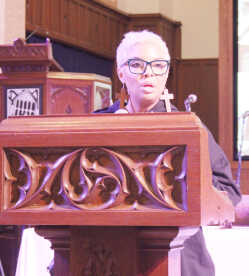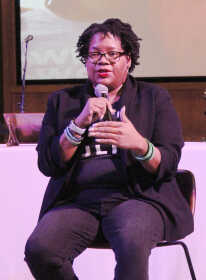Rev. Jones-Davis, Jones speak on persistence, having faith

This is the second of a two-part story on the recent Mendenhall Lecture event.
For Antoinette Jones, it was an extraordinary intervention when God told her to schedule a visit with her older brother Julius. This was as it was days before he was set to be executed by the state of Oklahoma.
Julius Jones was to be executed in November 2021, after being convicted in 1999 of first-degree murder. Since then, his sister and millions of other people have fought to see him free from a crime they fervently avow he did not commit.
Jones and Rev. Cece Jones-Davis both spoke to how the Justice for Julius movement has reinforced their sense of faith and resolve to conclude the recent two-night Mendenhall Lecture event at Gobin Memorial United Methodist Church.
Jones-Davis’ roots are in Halifax County, Va., which she described as a place, “full of Southern charm and sweet tea and nice people.” It was once the largest slave-holding county in the state, a history, she said, mars that charm. Enslaved people harvested its cotton and tobacco and built its plantations’ big houses.
Jones-Davis recounted how her grandmother, a descendant of slavery, was a woman of grace. She was employed by an affluent white family to look after one of those big houses. Jones-Davis yearned that this was what she did, but not who she was.
“My grandmother was the scribe of the Black community,” Jones-Davis said about her recording the lives, deaths and works of those on the fringe. “They came to her because she had a special way of communicating the humanity of people who often had no money and often had little reputation, and people who were living on the margins.”
To Jones-Davis, her grandmother knew how to find power and beauty in these individuals’ stories. She believed everybody’s lives mattered, that everyone deserved dignity. This was her moral responsibility because she could write.
Her grandmother’s example, she said, provided lessons about Jones-Davis’ own advocacy. This meant doing right because it is so and not for accolades. Most consequentially, she had to be responsible for what she came to know.
Jones-Davis said she came to know Julius Jones after she watched the 2018 ABC documentary “The Last Defense,” which details his trial and conviction in the murder of an insurance executive. She could not sleep after seeing how evidence was not brought to court, as well as a confession from another suspect.
As she began to work for him being removed from death row, Jones-Davis founded the Julius Jones Coalition, which banded together advocates and organized viewings of “The Last Defense” and a social media campaign.
“It’s important for you to know that none of us who cared about Julius knew what we were doing,” Jones-Davis said. “But what I do believe is that we had been led by the spirit of God day by day, and because we were persistent, extraordinary things have happened.”
Part of this was the campaign being taken up in 2020 by Represent Justice, a nonprofit that connected Jones-Davis with various influencers including T.D. Jakes and Scott Budnick. But, she suggested, people who are not like them made the difference.
Through this, Jones-Davis said she learned lessons about the power of persistence, about a difference between peace and quiet, and about communities being stronger than systems.
“We must knock on the door at midnight and disrupt the comfort of those who have the power and the resources to affect change,” she said, referring to the Parable of the Friend at Night in the Gospel of Luke.
“The problem with quiet is that it is not a good indicator about how things really are,” Jones-Davis said in turn. “Peace requires a deep work in the innermost places of our selves, in our communities. Peace requires noise; it requires words; it requires movement.”
Oklahoma’s governor Kevin Stitt commuted Julius Jones’ sentence to life imprisonment without the possibility of parole. This is despite the state’s parole board recommending twice to do so with the possibility of such.
“But I think there is some good news,” Jones-Davis provided. “The good news is that we have an opportunity to commit ourselves, and re-commit ourselves, to peacemaking in a fresh way.”

Antoinette Jones related how the day her bother was arrested, as multiple guns were pulled on her, influenced her perspective of police officers. While she learned about the law, she otherwise figured acting on a faith in people.
“It is important to be around people who care about you and love you,” Jones said as she sat next to Jones-Davis. “It is important to know people by the fruit that they bear, to know one spirit from another.”
Jones has worked with youth about fostering more positive interactions with police. For her, the truth is that not all cops are bad. To see that, she iterated, means parents talking to children about their role, but for officers to also reach out. That, it was suggested, is community-building.
She provided how she learned, like Jones-Davis, about persistence. She noted that people do not have to be “saved” to hear from God, but the struggle, she said, has seen her become more empathetic, more wanting to connect for equity.
“For me, it goes back to the old-school song, ‘I’m gonna treat everybody right,’” Jones referenced as inspiration. “In order for me to want that, I must be giving it. I must be the change that I seek to see in everybody else.”
